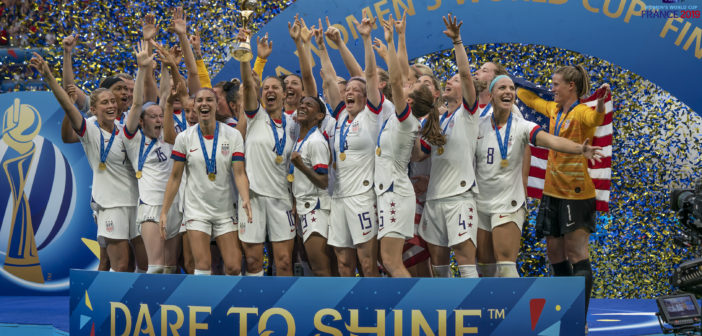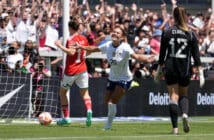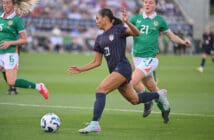After watching eleven games at the Women’s World Cup, it made an interesting change to be watching the males again when I visited the Hive, London for my first game since watching Megan Rapinoe’s USA team lift the World Cup in Lyon.
The hosts were Barnet FC, entering their sixth season in the Canons Park area of North West London, a good seven miles from Underhill their traditional home in the Barnet area of North London.
Their visitors were Yeovil Town from Somerset, an area known more for farming, cider, the Wurzels and accents with a beautiful burr. And once having had a pitch with a famous slope.
Barnet won the match 1-0 with a Simeon Akinola penalty on the hour splitting the sides, the 26-year-old Nigerian having won the penalty himself.
“Did male players watch women’s football for the first time this summer and see things to admire and emulate?”
Yeovil were clearly the better side in the first half hour and Barnet goalkeeper Scott Loach made a couple of key saves to protect an opening day clean sheet, the most spectacular, if not the most difficult, being from a Rhys Murphy free kick to protect the lead when it was a mere 16 minutes old.
But, in a game where both sides displayed a degree of ring-rustiness especially in front of goal, Barnet were marginally the better side in the last hour and improved as the game progressed. Congolese forward David Tutonda missed the Bees’ best chance, almost certainly a result of opening night nerves or rust.

Darren Currie could swear for Scotland had he not been born in Hampstead
The last notable thing about the game was that both managers were called Darren; Darren Sarll overseeing the visitors from Somerset, and Darren Currie, born in the rather posh area of Hampstead, berating the home side with a volley of expletives that was easily the most impressive volley seen or heard at the Hive yesterday.
My proximity to the action and to Currie’s ‘talking points’ perhaps was one of the more obvious differences between that famous day in Lyon and Barnet, and my jolt to start the article promised in the headline:
1. You don’t know football till you watch grass roots football
The press box at the Lyon Olympic Stadium was one of the highest I’ve ever sat in, also resulting in the most foolish decision I made while in France (and there was plenty competition).
On seeing that the lift was full, and being expertly goaded by Alyssa Roenigk, a younger American journalist, I decided to walk up there for the US v England semi final.
Alyssa was faster, younger and fitter.
I didn’t repeat the mistake four days later at the final.
At Barnet, gone from Lyon was the vertigo of the mile high press row and the packed press row, and I was returned to sea level and perhaps reality sitting ten feet from, and two feet, above the pitch.
Apart from Currie’s colourful language, several interesting asides were also audible. You could hear the players’ exhortations to each other to focus, the referee (in this case the young but very able Alan Dale) wisely using words not cards to defuse situations and the minor tactical reorganisations communicated from coach to team via the full backs and wingers throughout the game.
If you’ve only ever watched matches with over 10,000 spectators before, you’re missing out.
Take in a local game, and if possible, grab a seat next to the dug out.
2. Farewell FIFA Militia and grumpy untrained stewards
Gone too were the FIFA militia, determined to find an excuse to hamper your movements and make your coverage difficult.
They were often quite aggressive and enjoying the amount of intimidation they could lawfully demonstrate, at least until a superior, almost invariably female, hoved into view and dampen their ego trip.
On one occasion, I observed a male FIFA employee whose body language towards a small English female journalist seemed so intimidating, that I took a photo of him in case she felt obliged to launch a complaint and might need evidence.
Luckily he left her alone but only to bound over to me to demand why I was taking photos in the interview area. When I explained (in French) it was in case my colleague made a formal complaint about his intimidatory behaviour towards a female journalist, he shuffled off never to be seen harassing 5′ 2″ women again.
On another occasion, a FIFA strongman actually prevented me leaving my seat in the press row in case I wandered into a nearby VIP freeloading zone. It was two hours before kick off, and I’d just come to dump my computer and locate my seat.
At Barnet however, I was agreeably left alone to the point that no-one even knew how and where I was supposed to enter the stadium, being redirected three times. But always they were friendly.
The Hive is clearly no place for testosterone induced stewarding.
3. OK, I’ve avoided it for long enough – men’s football and women’s football are not identical
It is a well accepted inevitability of writing about both men’s and women’s football that if you dare to compare the two, or even if you write about both and studiously avoid comparisons, you will get abused by the PC brigade if you swing one way, and the anti-PC brigade if you sway the other.
This partly explains why many journalists, if given the choice, prefer not to cross the gender divide and write about both.
To be fair, this idea that women’s football is a feminist cause and makes a political point just by its mere existence is far more an American concept than a European one.
In France, I spent many hours meeting and listening to both hardcore and casual fans of the English Lionesses, the Scottish WNT and fans of other European nations. With very few exceptions, they were there for the football as opposed to a political crusade or to make a statement.
So with that enormous and sweeping caveat, let’s dive right in.
Undiluted male aggression was of course back in its full glory, Barnet’s bearded James Dunne being a facial embodiment of it.
On a day where many laudably tried to exhibit skill as much as raw force, notably Yeovil’s excellent midfielder Tom Whelan, Dunne was perhaps the most aggressive player on the park
One excellently timed tackle, in what has to be said was a non-crucial area of the field, saw him emerge from his grounded position with a facial expression that made King Kong look like Syd Little. (Yes, I did think about using Michael Gove there).

Off the pitch James Dunne’s as mild as milk and very thoughtful about his game but he will bring his aggressive style to Barnet’s season
Perhaps his 110 games as an Exeter player gave him more incentive to get stuck into Yeovil. Or maybe, making his debut for Barnet gave him good reason to show the majority of the 1666 in attendance what he would bring to their promotion hopes.
I asked him what part raw aggression plays in his game:
“I hate to lose. I try my hardest all the time. The aggression side of it, I’ve always had that. I like to tackle that’s just how I am and how I play.
“Sometimes the way I play, I will mistime tackles. That’s just the way of the game.”
But as with any attempt to draw neat and simplistic conclusions, there are nuances, as Dunne explained.
“Because I think I can read the game well, if I know I’m not going to get there, (then) I’m not going to get there so I’m not going to go lunging in and let them play around. There are a lot of good players in this league.
“You do have to be a bit careful with the tackles that you do go into but most of the tackles that I think I’m going to win, I will not shy out. That’s just how I am as a player.
“If you can read the game ahead of your opponent and you know where the ball’s going to land, you don’t need to use as much aggression.”
None of this means that the women do not bring every sinew of their being in effort, clearly they do. However they may just think a little harder, and do so perhaps in more circumstances than the men, before they lunge in.
Of course the main difference between Barnet v Yeovil and USA v Netherlands, might just lie as much in the ability level as gender stereotypes. Also one match was a season opener and the other a season and even a career closer.

A Yeovil fan arrives for the game
But where’s the fun in discussing that?
4. Let’s talk about diving and embellishment
As mentioned before, referee Alan Dale had a very good outing for a young referee. The players treated him with respect but also, they treated the game with respect.
I cannot recall a single dive.
At no time did a throng of players surround Dale. No one waved imaginary yellow cards, trying to get an opponent booked. No-one rolled over several times after a tackle. In fact, there was only really one bad tackle throughout.
The men behaved as sportingly as most of the women had throughout the World Cup and knowing already that the answer is “too early to say”, they are prompting the question:
Did more players watch women’s football for the first time this summer and see things to admire and emulate?
Is it possible that the women’s general fair play has embarrassed their stronger, more aggressive and better paid colleagues into better behaviour?
If so, which women will have the guts to be the first to say it publicly and take the credit on behalf of all women players everywhere?
As an acid test, please try this experiment: Bump into your television gently when there’s a Juventus game on, and see if Cristiano Ronaldo falls over.
If he doesn’t, then the men have finally learned something from the women!
1. The biggest similarity between USWNT v Netherlands Women and Barnet Men v Yeovil Men
The Hive London (well actually in Middlesex) and the Olympic Stadium in Lyon lie 609.37873 miles apart.
Culturally, the Women’s World Cup Final and the opening day of England’s non league stadium are worlds away.
Men and women however do not “play a different game”. They play the same game differently.
In both versions, they players try to pass the ball to their friends, tackle their opponents, obey the coach, and most of all try and stick the round leather thing into the goal.
In both versions, they try and entertain the crowd.

Dutch fans experience a range of emotions at the World Cup Final in Lyon
Photo: Jeff Wong (Prost Soccer)
In both versions, the players sweat and perhaps bleed during the game and hurt after it.
In both versions, older players guide the younger through the game whether it be Lucy Bronze or Tom Whelan.
And for us who are not as fast, fit or young enough to climb 200 feet, and therefore have to be content to watch; in both versions, we cheer, boo, groan, and leave feeling either elated or disappointed.
And finally …..
Is there a difference between watching as a journalist and watching as a fan?
Of course there is, but I’ll be able to tell you after August 9 when I’ll be at Partick Thistle v Dundee United, scarf around my neck, beer improving my judgment, and a volley of Darren Currie-like expletives ready to be launched at United player and referee alike.
I don’t know who the referee will be but I am 100% certain he won’t look as good (or as impartial) as Alan Dale did from the neutrality of the press box.
Besides, Partick Thistle v Dundee United has somewhat of an infamous history of mystifyingly bad refereeing controversies.
See: Partick Thistle v Dundee United – proud home of the worst refereeing decisions EVER
By the same author:
Op-Ed: EFL Playoffs have replaced FA Cup Final in English fans’ hearts and minds
No Scotland No Party. Nice had both (and England fans were invited)
Unsung Heroes: Leanne Crichton
Boundary Bletherings: Middlesex must become more ruthless when they have the advantage
American soccer says goodbye to Sigi Schmid in emotional farewell service in LA
The last time Chelsea lost 6-0
2018: The ones I’ll miss most: Eric Bristow – the Crafty Cockney
![Prost International [PINT]](https://prostinternational.com/wp-content/uploads/2021/08/PINTtFontLogoRoboto1536x78.jpg)



